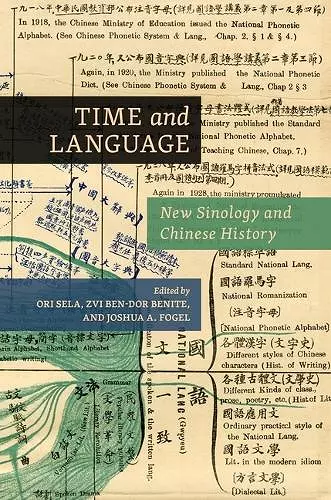Time and Language
New Sinology and Chinese History
Joshua A Fogel author Peter C Perdue author Theodore Huters author Pingyi Chu author Zvi Ben-Dor Benite author Joshua A Fogel editor Zvi Ben-Dor Benite editor Ori Sela editor
Format:Hardback
Publisher:University of Hawai'i Press
Published:31st Mar '23
Currently unavailable, and unfortunately no date known when it will be back

China’s past and present have been in a continuous dialogue throughout history, one that is heavily influenced by time and language: the temporal orientation and the linguistic apparatus used to express and solidify identity, ideas, and practices. Presenting a host of in-depth case studies, Time and Language: New Sinology and Chinese History argues for and demonstrates the significance of "New Sinology" by restoring the role of language/philology in the research and understanding of how modern China emerged. Reading the modern as a careful and ongoing conversation with the past renders the "new" in a different perspective. This volume is a significant step toward a new historical narrative of China’s modern history, one wherein "ruptures" can exist in tandem with continuities. The collection accentuates the deep connection between language and power—one that spans well across China’s long past—and hence the immense consequences of linguistic-related methodology to the comprehension of power structures and identity in China.
Each of the essays in this volume tackles these issues, the methodological and the thematic, from a different angle but they all share the Sinological prism of analysis and the basic understanding that a much longer timeframe is required to make sense of Chinese modernity. The languages examined are diverse, including modern and classical Chinese, as well as Manchu and Japanese. Taken together they bring a spectrum of linguistic perspectives and hence a spectrum of power relations and identities to the forefront. While the essays focus on late Qing and early twentieth-century eras, they refer often to earlier periods, which are necessary to making real sense of later eras. The methodological and the thematic do not only converge, but also generate a plea for fostering and expanding this approach in current and future studies.
This is a richly researched and intelligently argued collection of studies that highlight a key methodological and interpretive issue in China studies and provides a considerable empirical detail that makes their point. The volume delivers on the promise of the editors to bring language/philology back in—to argue for and demonstrate the significance of “New Sinology”: the careful attention to historical language and knowledge in texts both contemporary and earlier to illuminate the power of cultural habitus as well as conscious practice over time as expressed in the written version of Austin’s speech acts. These studies show that the tools of traditional Sinology, with a focus on linguistic and philological expertise, can and do contribute meaningfully to our understanding of the genesis and experience of modern China." —Timothy Cheek, The University of British Columbia
ISBN: 9780824894078
Dimensions: unknown
Weight: unknown
277 pages